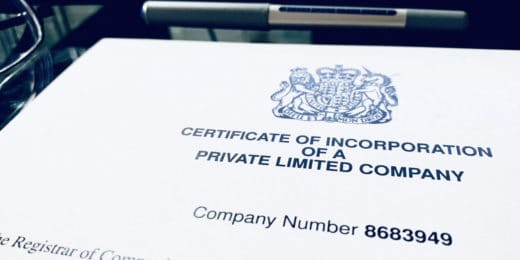There is a wealth of information available online extolling the benefits of forming a limited company. Whether you’re a startup or an established business owner keen to switch from a sole trader or partnership model to an incorporated company or LLP structure, you will find troves of government information and well-written business blogs offering valuable guidance for all stages of your business journey. Below, we will take a look at a selection of useful resources that we recommend.
What is a limited company?
One of the first steps for prospective company owners/directors is to understand the implications of setting up a limited company and determine whether it’s the right business structure for them. It’s a good idea to do some research into the basics before setting up a company.
- What is a limited company? (Rapid Formations) – explains how a limited company is classed as a legal ‘person’, what the concept of ‘limited liability’ means to owners/directors, and the benefits provide.
- What does it mean to be a ‘limited’ company? (Companies House) – a basic explanation of the framework of limited companies, including links to resources for choosing company names.
- Limited company advantages and disadvantages (Rapid Formations) – it’s useful to know the potential downsides of running a limited company, as well as the benefits. This article sets out the pros and cons of incorporation.
- Limited companies (GOV.UK) – this short government information page specifies the essential criteria which define a company limited by shares as opposed to a company limited by guarantee.
Choosing a company name
All companies must choose a name when they register with Companies House. As well as various marketing and branding considerations (see below) which come into play when selecting a name, there are plenty of rules which must be followed to avoid a company registration application being rejected.
- How to choose a company name (Rapid Formations) – this blog provides some top tips for deciding on a name for a limited company, including making it memorable, easy to pronounce and meaningful, whilst also allowing room for growth and diversification.
- Choose a company name (GOV.UK) – information highlighting the main rules surrounding company nomenclature. These rules include: ensuring that names are not considered identical or too similar to other company names (i.e. ‘too like’ and ‘same as’ names); not using any words which are considered offensive or sensitive (e.g. including a word that represents a regulated activity); and that the name ends in either ‘Limited’ or ‘Ltd’.
Forming a limited company
The actual process of company incorporation (i.e., officially forming a limited company and getting it registered at Companies House) may seem daunting at first. But once the groundwork is in place and the key decisions have been made, applying to register a company is generally fast and straightforward – especially if you use a company formation agent.
Nevertheless, there are various complications which can arise, so it’s important to do some preliminary research first.
- What is company formation? (Rapid Formations) – this blog explains the concept of incorporation and sets out some of the key requirements of company formation (e.g. memorandum and articles of association, supporting documentation for sensitive words in a company name, etc).
- Why should I use a company formation agent to form my company? (Rapid Formations) – although there are other methods of incorporation, using a company formation agent is generally the most efficient and comprehensive. This article explains why this option results in a fast turnaround at low cost, and outlines some of the other benefits of using a formation agent (e.g., less chance of an application being rejected) and additional services offered.
- Register your company (GOV.UK) – other ways of forming a limited company (e.g., direct with Companies House or using third party software) are outlined by this government webpage.
- 10 mistakes to avoid when forming a limited company (Rapid Formations) – this blog reveals some of the most common errors in company incorporation applications (which may lead to the application being rejected) and explains how to avoid making mistakes when forming a limited company.
- Do I need an accountant to set up a limited company? (Rapid Formations) – many prospective company owners falsely believe that an accountant is required to form a limited company. This blog dispels this rumour and explains why using a company formation agent is generally a far more cost effective option.
Offices and employees
Many companies start off with a single director who is also the owner and sole employee. Initially they might work from home, but as the business expands it may be necessary to take on new employees and provide them with office space or other types of business premises.
No matter how small the company, directors should understand the basics of employment law, as well as the requirement to provide a registered office address to Companies House.
- Registered office – what is it? (Rapid Formations) – limited companies have to provide a registered office address during the company formation process. In the case of home-based businesses, although a home address can be used, it may be preferable to use a commercial address. Company formation agents normally offer a registered address service – and they can even handle general business mail.
- Health and safety guidance (HSE) – companies which employ staff must comply with their health and safety duties. For those with business premises, there are further requirements to ensure sufficient standards.
- PAYE and payroll for employers (GOV.UK) – companies with employees must register with HMRC as an employer and set up payroll (PAYE).
- Employment law advice (Acas) – any company which employs staff must understand the various legal obligations which it owes to its employees, as well as ‘workers’ who are not employees.
Annual filings
Anyone starting up a limited company should be aware of their legal obligations to submit annual filings. This is particularly important in the case of existing business owners who are more accustomed to the lighter administrative burdens of operating as a sole trader or partnership.
- An introduction to the annual confirmation statement (Rapid Formations) – this blog explains the key elements of the confirmation statement (previously known as the ‘annual return’), along with filing deadlines.
- Filing your company’s confirmation statement (GOV.UK) – this government resource provides guidance on the process of filing a confirmation statement. It includes the requirement to disclose any changes to the PSC register (see Register of People with Significant Control for more information).
- Accounts and tax returns for private limited companies (GOV.UK) – limited companies have to prepare full annual accounts and a company tax return at the end of each financial year. This information page explains what is required, the deadlines involved, and the filing process.
- Self Assessment for directors (Rapid Formations) – former sole traders and partners will already be familiar with Self Assessment filings. This blog covers the main points and also mentions tax efficiency measures available to company directors which can be achieved through dividends.
- Late filing penalties for limited companies (Rapid Formations) – this page highlights some of the penalties that can be incurred by companies that do not meet the annual filing deadlines.
Responsibilities of company directors
Anyone forming a limited company will need to be aware of their responsibilities as a company director. This includes the extent of any potential legal and financial liability, as well as the possible penalties, such as disqualification.
- Being a company director (GOV.UK) – this page explains some of the responsibilities directors owe to Companies House in terms of annual filings, etc. It also sets out the general duties of company directors under chapter 2 of the Companies Act 2006:
- Duty to act within powers
- Duty to promote the success of the company
- Duty to exercise independent judgment
- Duty to exercise reasonable care, skill and diligence
- Duty to avoid conflicts of interest
- Duty not to accept benefits from third parties
- Duty to declare interest in proposed transaction or arrangement
- Are directors of a limited company liable for its debts? (Rapid Formations) – although shareholders are generally protected from the financial liabilities of a company (beyond the value of their shares), directors (who are often also shareholders) can sometimes become personally liable for company debts. This blog explains the implications of these directors’ liabilities.
- Being disqualified as a company director (Companies House) – this piece explains the effects of a director’s disqualification order, some of the circumstances which lead to this penalty and how to find out if a director has been disqualified.
Marketing and branding
Anyone forming a limited company should consider how they will market their business and build up a brand. The choice of a company name (dealt with above) will often be connected to brand building, but there are other factors to take into account.
- Branding 101: An introduction (Rapid Formations) – this blog takes a look at how a business can benefit from branding, the elements which lead to the success of a brand, and how to re-brand if required.
- 10 things you need to do before building a business website (Rapid Formations) – this piece explains why a company website is so important from a marketing standpoint, how to choose a suitable domain name and the importance of content, amongst other website tips and tricks.
- If you’re starting a new business – here’s how NOT to fail (Rapid Formations) – this blog is not just about marketing, but it contains useful information on various aspects of business success including logo design, SEO and gaining customer reviews.
Please note that the information provided in this article is for general informational purposes only and does not constitute legal, tax, or professional advice. While our aim is that the content is accurate and up to date, it should not be relied upon as a substitute for tailored advice from qualified professionals. We strongly recommend that you seek independent legal and tax advice specific to your circumstances before acting on any information contained in this article. We accept no responsibility or liability for any loss or damage that may result from your reliance on the information provided in this article. Use of the information contained in this article is entirely at your own risk.






Join The Discussion
Comments (4)
Thank you for your valuable information
Thank you for your kind comment.
Kind regards,
The Rapid Formations Team
Well research and resourceful content indeed. Thank you for this useful material! It’s amazing!
Thank you for your kind comments, Julia. We’re glad you enjoyed our blog article.
Regards,
Rachel